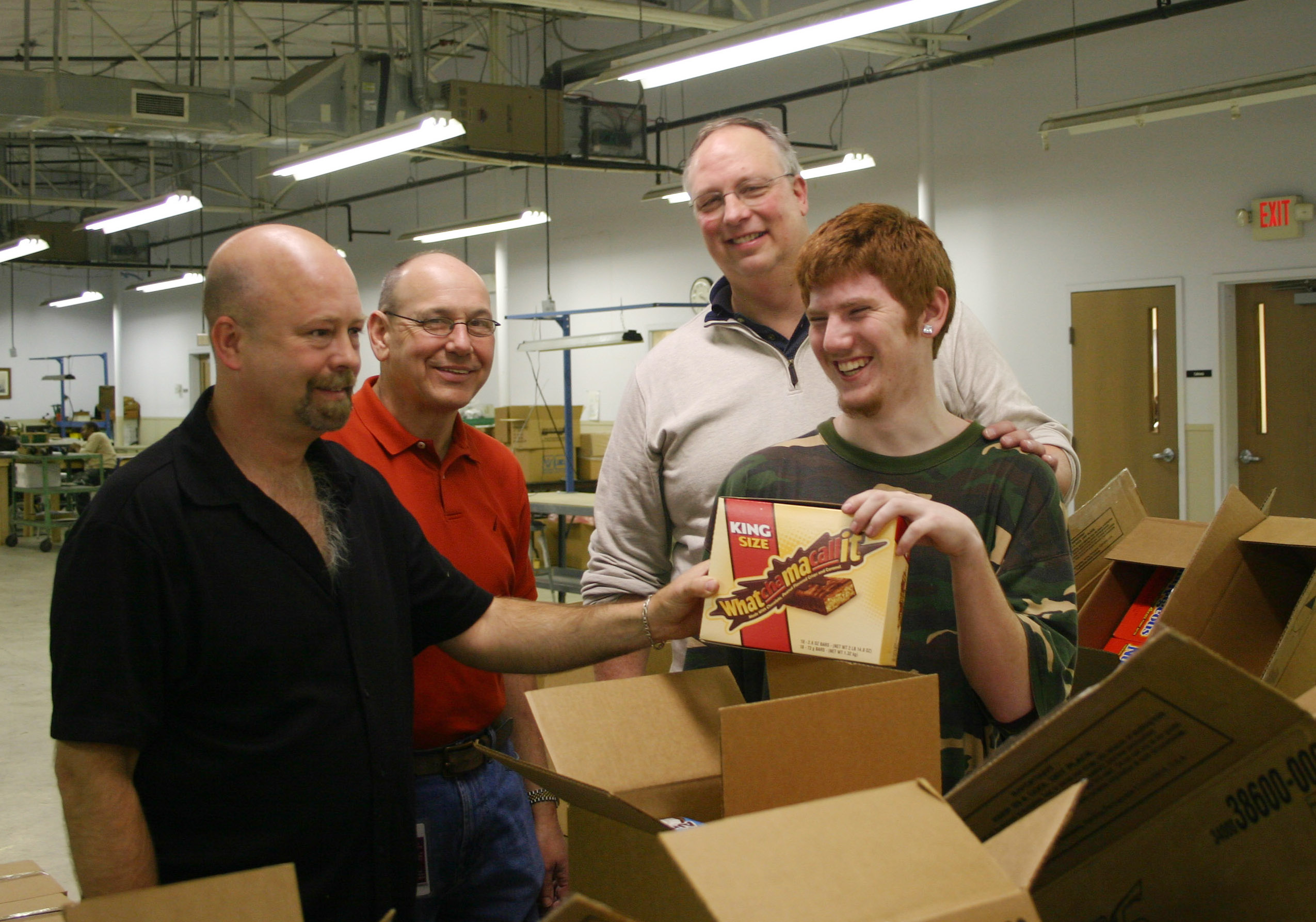College News
Sanford businessmen bring ‘lean’ to Lee County Industries
Notice: This article is older than 12 months. Names, contact information, programs, titles, etc. might have changed. If you have any problems please call the main college number, 1-800-682-8353, and we will be happy to direct you accordingly.

click image to enlarge ⊗
Kendall Crawford (left), Keith Lewis, and Bob Jones (back) were among a group of Sanford businessmen ... (more)
03.26.2009 • College & Community
SANFORD - Workers at LCI Inc., are working leaner these days, thanks to the help of several Sanford businessmen.
"'Lean means operating more efficiently and with better job skills," said Kendall Crawford, a Sanford manufacturing consultant. "Their future employers will have solid employees."
Lee County Industries, Inc. opened in 1967 as a sheltered workshop for people with disabilities. It became a community rehabilitation program serving more than 100 participants each year and managing a budget of well over $1 million. A nonprofit organization, it provides rehabilitation and educational training to youth and adults with barriers to employment. Contract work from local industries enables them to learn and apply job skills and earn a paycheck.
Cathy Swindell, director of Industrial Services for Central Carolina Community College, saw the need to make LCI's work environment more efficient and effective. She works with businesses to train and upgrade their workers' skills as well as redesigning their work areas. Her office receives funding from the state to do this, but no funds are available through her office to work with nonprofit agencies.
Swindell took the challenge to some local businessmen. Their companies contract with LCI for work, so they understood the importance of helping.
"These folks tend to be the last hired and first fired," said Bob Jones, from Solomon EOS, LLC. "Anything we can do to help them be more employable, we want to do."
The businessmen looked over the operations at LCI and saw improvements that could easily be made. For example, on one job, LCI participants packed boxes of snacks to be loaded in snack machines at a company. Each participant was choosing snacks from 11 different boxes and packing each job box individually.
"We identified the individuals' skill sets and created a workflow to get more work done with less effort," said Kendall Crawford, a manufacturing consultant.
Efficiency and contract-filling time improved greatly as a result. Instead of long tables in rows, the tables were restructured into a U-shape, with workers on both sides. Each worker packs only one type of snack. The packing is done in a specific sequence to ensure that all the items fit in the shipping box. It doesn't take very long to fill up a lot of boxes.
One person was designated as a material handler to make certain that those packing always have items available to pack, but that there are not boxes of items sitting around, cluttering up the work area.
"This type of work area is called 'a lean cell' in industry," said Keith Lewis, who works for Hanesbrand, Inc., in Sanford, and helped with the workspace redesign at LCI.
Jones said that LCI participants don't want work because people feel sorry for them, but because they are competent.
"I've been in manufacturing 30 years," he said. "The people we worked with today are as good as any crew. They will be a big asset to any organization."
The redesigned work area is having a significant impact, said Meg Moss, LCI director.
"I just can't say enough about these guys who are volunteering their time and what they are doing for LCI and the people who participate in our programs," Moss said. "Cathy Swindell did an great job at setting us up with them. They truly have been a blessing to us during a very difficult economic time. We're now much more efficient, are using our space much more wisely, and saving tons of time. They are also taking us through an analysis to develop a three- and five-year plan for LCI."
Moss said that, as a result of the redesign, LCI has already procured a contract with a company it had not previously worked with.
For more information about LCI Inc., go online to www.lciinc.org or call (919) 775-3439. For more information on the college's Industrial Services, call (919) 718-7212 or cswindell@cccc.edu.
Categories
- Admin, Faculty & Staff Category
- Arts & Entertainment Category
- Clubs Category
- College & Community Category
- College General Category
- Continuing Education Category
- Curriculum Programs Category
- Distance Education Programs Category
- Facilities/Buildings Category
- Finances Category
- Foundation Category
- Graduations Category
- Lee Early College Category
- NCCCS Category
- SGA Category
- Special Events Category
- Sports Category
- Students/Graduates Category
- Uncategorized Category
Archives

